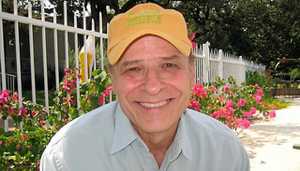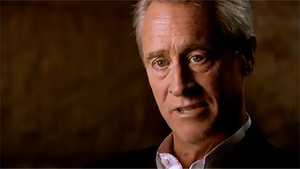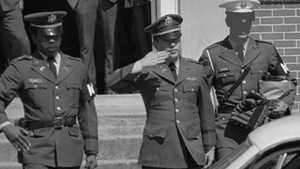Music of My Lai
By Cori Brosnahan

“I know you're set for fighting, but what are you fighting for?” Phil Ochs asked in his famous 1963 song. Today, we remember protest tunes from artists like Ochs, Dylan, and Seeger, but the Vietnam war spawned its own musical genre, with songs as divided as the nation. Few events caused as much division and soul-searching as the massacre of Vietnamese civilians by American troops at My Lai on March 16, 1968; when news of the massacre reached the American public, it inspired a sonic explosion that still reverberates today. The songs get to the heart of our ideas of war, duty, and heroism — and how, with time, they can change shape.
UK-based researcher Justin Brummer started studying songs of the Vietnam War while preparing his PhD. It soon became his main focus of interest, and today he has catalogued some 5,000 songs, including 91 that specifically reference the massacre. The vast majority of them deal with Lieutenant William Calley, the man who commanded the troops at My Lai and gave the order to kill civilians.
Recalled to the United States over a year after the events took place, Calley was court-martialed beginning on November 10, 1970. Whatever horror the American public may have felt in learning about the killings, it didn’t initially extend to the man who ordered them. Calley’s conviction — the only one in connection with My Lai — caused a national uproar. President Richard Nixon received 5,000 telegrams on the subject, nearly all them in support of Calley. Meanwhile, a poll conducted by Louis Harris and Associates in April 1971 found that 77 percent of those surveyed thought Calley had been singled out as a scapegoat, and 65 percent disagreed with the conviction.
That sentiment was clearly reflected in the music of the day. Brummer reports that from 1969 to 1973, pro-Calley songs outnumber anti-Calley songs 2-1. They justify his actions in a variety of ways: Calley was under attack, Calley was confused, and, perhaps most significantly, Calley was just following orders.
“During war time, people are really protective of soldiers and veterans and I think that’s the main thing that comes out,” says Brummer. “A lot of the songs portray Calley as a brave man who answered his country’s call. The government trained him and gave him a gun, and now they want to put him in prison for doing exactly what they told him to do.”
As the death toll climbed, Americans became increasingly opposed to what many considered an unwinnable war. By 1969, a majority of Americans opposed the war, and many of the pro-Calley songs blame the government for the damage done. Rick Riddle’s 1971 track “Hang on Bill” declares that, “The enemy are cowards walking free in our land” who “send our young boys off to war, it seems we'll never win.” Others, like Big Bill Johnson’s “Set Lieutenant Calley Free,” paint Calley as a Jesus-like figure: “We’re sick of fighting/ You’ve nailed Lieutenant Calley to a tree.” Meanwhile, James Armstrong’s “Thank God, Calley Wasn’t Black” criticizes the government from a civil rights perspective, defending the soldier, while wondering what would have happened if he was African American.
By far the most popular pro-Calley (and overall My Lai-related) song was Terry Nelson’s “The Battle Hymn of Lieutenant Calley.” The song starts in third-person, but quickly shifts to first — that of Lieutenant Calley, who tries to justify his actions: “Sir, I followed all my orders and I did the best I could/ It's hard to judge the enemy and hard to tell the good.” Released in 1971, it peaked at #37 on the Billboard’s Hot 100. But despite its success, a proposed cover by country star Tex Ritter was canceled when the record label decided it was too controversial to release while Calley’s trial was in progress.
Anti-Calley songs, in contrast, numbered far fewer and didn’t gain nearly as much airplay. Some, like Pete Seeger’s “Last Train to Nuremberg" have since become well-known, but at the time their popularity was confined to anti-war circles — where they marked a significant departure from the music that came before.
Gone were efforts to protect the troops. Tom Parrott’s 1970 song “Pinkville Helicopter”called the soldiers a "pack of mad dogs, just killing to see people dying," and describes the Lieutenant’s gun as "smoky and hot from the killing." Ivan Lee’s 1971 single “The Cry of My Lai” addresses Calley directly, telling him that "the devil possesses your soul." Yoko Ono’s “Now or Never” doesn’t mention My Lai by name, but the artwork for the single features the famous picture of civilian bodies in a ditch taken by a U.S. Army photographer at the scene.
Convicted for the premeditated murder of 22 civilians, Calley was initially sentenced to life imprisonment. In the end, he was saved from that fate by popular sentiment. Overwhelmed by the public’s demand to “free Calley,” President Nixon had him removed from the army stockade and placed under house arrest. His sentence was reduced twice; on November 9, 1974, less than three years after his conviction, Calley was released on parole.
But the Lieutenant’s acclaim seemed to die as quickly as it came. Brummer hasn’t found a single pro-Calley song recorded after 1973; the post-war songs appear to be unanimous in their condemnation. In time, history found new heroes to tell stories about. And so you end up with songs about Hugh Thompson.
During the My Lai mission, Thompson was a helicopter pilot whose objective was to draw fire from enemy combatants, thereby allowing ground troops to discover their locations. From the air, he saw American troops killing Vietnamese civilians and tried to save them. Later, Thompson reported the atrocities to superiors and testified about My Lai before the Senate.
At the time, Thompson was vilified and accused of being unpatriotic. He received death threats and dead animals on his porch. He wasn’t mentioned by name in any song recorded during the war. It took decades before the pilot was recognized for his courage. Finally, on March 6, 1998, the Army presented Thompson with the Soldier's Medal, for heroism not involving conflict with an enemy.
That same year, indie singer David Rovics self-released the track "Song for Hugh Thompson." Thompson, Rovics sings, "decided at that moment to fight for what was right." In so doing “he served his country well/ On the day he saved the lives of a dozen kids in hell." More voices would join in; in 2007, alt-rock band The Oaks released "For Hugh Thompson, Who Stood Alone. My Lai Massacre, Vietnam, 1968." Imagining the scene Thompson encountered, the singer zooms in on the moment of the decision itself: “As the silence slowly descended between infamy and fame/ Your name was on the lips of both angels and demons/ Did justice plant herself as an anchor in you mind?”
Fifty years after the My Lai Massacre, Americans are still talking — and singing — about it. Back then, people praised the soldier who “followed orders” and condemned the soldier who listened to his own conscience. Today, they do the opposite. New songs shape old memories of an event that seems impossible to come to terms with. “People look back on it from a contemporary perspective and you get songs about a Hugh Thompson,” says Brummer. “They’re trying to correct it.”
Published March 2018.







